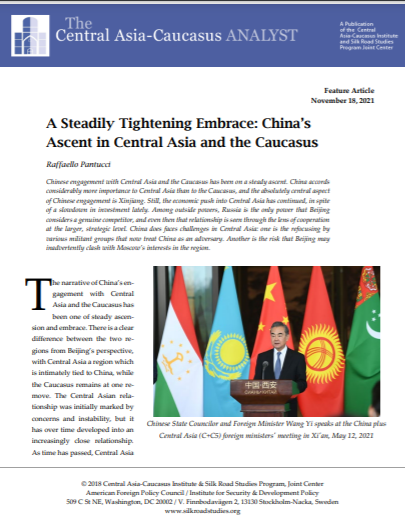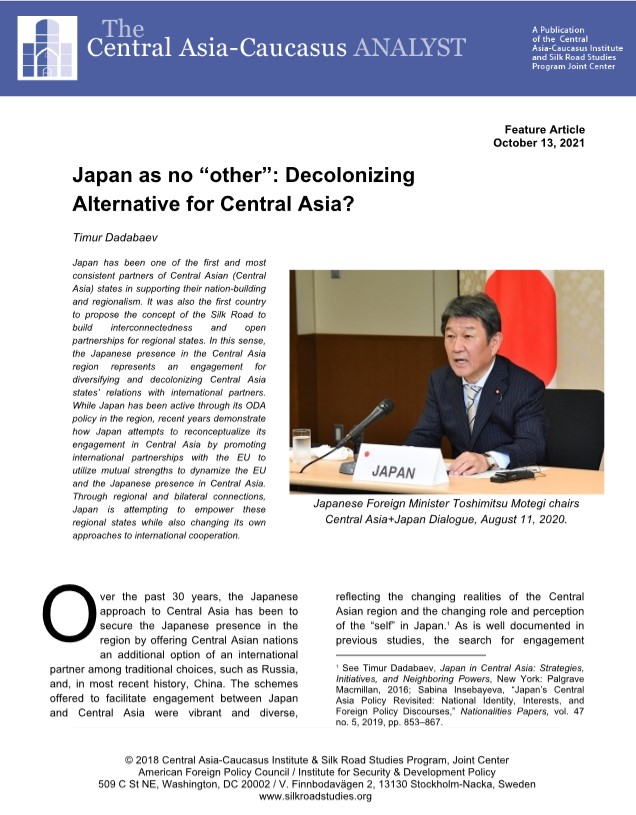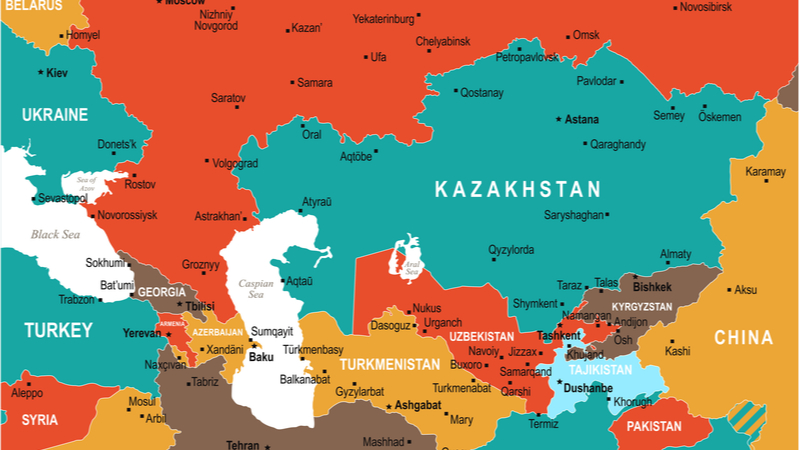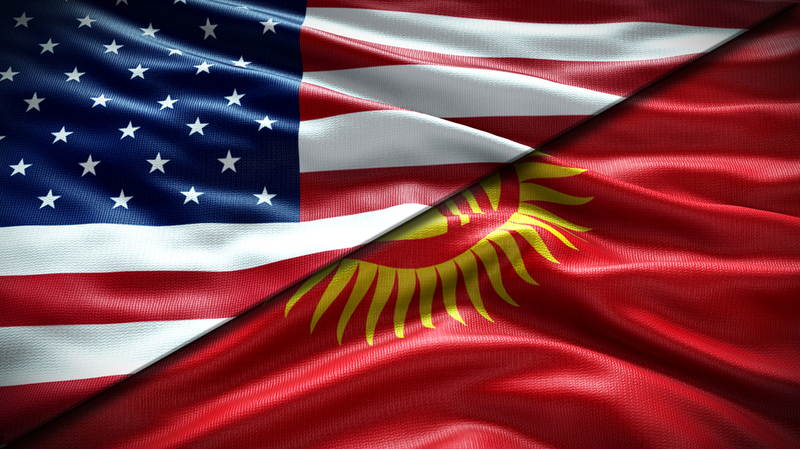A Steadily Tightening Embrace: China’s Ascent in Central Asia and the Caucasus
A Steadily Tightening Embrace: China’s Ascent in Central Asia and the Caucasus
By: Raffaello Pantucci
 Chinese engagement with Central Asia and the Caucasus has been on a steady ascent.China accords considerably more importance to Central Asia than to the Caucasus, and theabsolutely central aspect of Chinese engagement is Xinjiang. Still, the economic push intoCentral Asia has continued, in spite of a slowdown in investment lately. Among outsidepowers, Russia is the only power that Beijing considers a genuine competitor, and even then that relationship is seen through the lens of cooperation at the larger, strategic level. China does faces challenges in Central Asia: one is the refocusing by various militant groups that now treat China as an adversary. Another is the risk that Beijing may inadvertently clash with Moscow’s interests in the region.
Chinese engagement with Central Asia and the Caucasus has been on a steady ascent.China accords considerably more importance to Central Asia than to the Caucasus, and theabsolutely central aspect of Chinese engagement is Xinjiang. Still, the economic push intoCentral Asia has continued, in spite of a slowdown in investment lately. Among outsidepowers, Russia is the only power that Beijing considers a genuine competitor, and even then that relationship is seen through the lens of cooperation at the larger, strategic level. China does faces challenges in Central Asia: one is the refocusing by various militant groups that now treat China as an adversary. Another is the risk that Beijing may inadvertently clash with Moscow’s interests in the region.
Japan as no “other”: Decolonizing Alternative for Central Asia?
Japan as no “other”: Decolonizing Alternative for Central Asia?
By: Timur Dadabaev
 Japan has been one of the first and most consistent partners of Central Asian (Central Asia) states in supporting their nation-building and regionalism. It was also the first country to propose the concept of the Silk Road to build interconnectedness and open partnerships for regional states. In this sense, the Japanese presence in the Central Asia region represents an engagement for diversifying and decolonizing Central Asia states’ relations with international partners. While Japan has been active through its ODA policy in the region, recent years demonstrate how Japan attempts to reconceptualize its engagement in Central Asia by promoting international partnerships with the EU to utilize mutual strengths to dynamize the EU and the Japanese presence in Central Asia. Through regional and bilateral connections, Japan is attempting to empower these regional states while also changing its own approaches to international cooperation.
Japan has been one of the first and most consistent partners of Central Asian (Central Asia) states in supporting their nation-building and regionalism. It was also the first country to propose the concept of the Silk Road to build interconnectedness and open partnerships for regional states. In this sense, the Japanese presence in the Central Asia region represents an engagement for diversifying and decolonizing Central Asia states’ relations with international partners. While Japan has been active through its ODA policy in the region, recent years demonstrate how Japan attempts to reconceptualize its engagement in Central Asia by promoting international partnerships with the EU to utilize mutual strengths to dynamize the EU and the Japanese presence in Central Asia. Through regional and bilateral connections, Japan is attempting to empower these regional states while also changing its own approaches to international cooperation.
Tilting at windmills: Washington's quest for bases in Central Asia
By Stephen Blank
November 24, 2021, the CACI Analyst
As part of the continuing story of the U.S. involvement in Afghanistan Washington is evidently still negotiating for bases in Central Asia. The idea here is to be able to carry out “over the Horizon” (OTH) operations in Afghanistan for counter-terrorist purposes. It also turns out that Washington and Moscow were discussing this issue in the talks between Chief of the General Staff, General Valery Gerasimov and General Mark Milley, Chairman of the Joint Chiefs of Staff. Those discussions apparently derived from remarks made by President Putin in his earlier summit with President Biden in Geneva offering the U.S. the opportunity to base evacuation flights in Russian bases in Central Asia.

Kyrgyzstan's Initiative: A small land shows Washington a way forward
By S. Frederick Starr
November 23, 2021, the CACI Analyst
Relations between the U.S. and Kyrgyzstan have been in a slump since the small country closed the U.S. air base at Manas in 2014. In the limited attention Washington has accorded Central Asia since then, Kyrgyzstan has not figured in a visible way. This could change: new nationalist Kyrgyz President Sadyr Japarov appears to have concluded Kyrgyzstan must balance its over-dependence on Russia and China. Bishkek has embarked on a path of cordial and productive engagement with the West, and especially the United States. His government prepared a document setting forth a full range of new relations with Washington and transmitted it to the U.S. State Department. It remains to be seen whether Washington will embrace President Japarov’s bilateral initiative and perhaps even expand beyond it by adding initiatives and projects of its own.

Tokayev’s Reforms: An Evolutionary Model of Change?
Tokayev’s Reforms: An Evolutionary Model of Change?
By: Svante E. Cornell and Albert Barro
Much ink has been spilled in recent decades on the failures of democratization in the Middle East and Central Asia. Indeed, for over a decade and a half, Freedom House and other democracy watchdogs have been documenting a clear regression of dem-ocratic development. This has happened not only in countries considered in “transition”, but also in established democracies, where authoritarian tendencies have, unexpectedly, returned.
The Middle East and Central Asia have proven particularly resistant to democratic development. The resilience of authoritarian systems of govern-ment in these regions caused considerable frustra-tion, which switched to great excitement when popular revolutions against corrupt and dysfunc-tional government took place between 2003 and 2011. The wave of revolutions began in Georgia, followed by Ukraine and Kyrgyzstan, upheavals quickly dubbed “color revolutions.” These were followed several years later by the 2011 “Arab spring”, which similarly generated great hope that democracy had finally come to the Middle East.
Except it did not work out that way. The color revolutions and Arab upheavals must now be termed a failure, as no country that experienced these upheavals has progressed in a sustainable way toward democracy. Some, like Libya, Syria and Yemen have descended into civil war. Others, like Ukraine and Kyrgyzstan, experienced recur-rent political crises while continuing to be mired in corruption. For some time, Georgia and Tunisia appeared to go against the grain, and make sus-tained progress – but in recent years, those two have also backtracked. All in all, it seems clear that revolution is not a sustainable model to change entrenched authoritarian habits.







